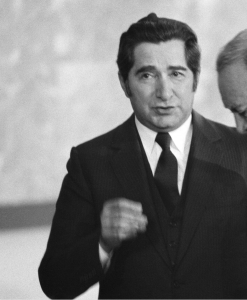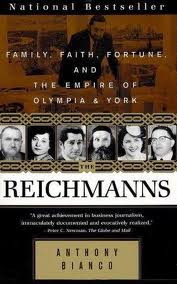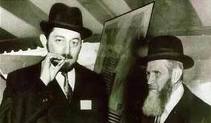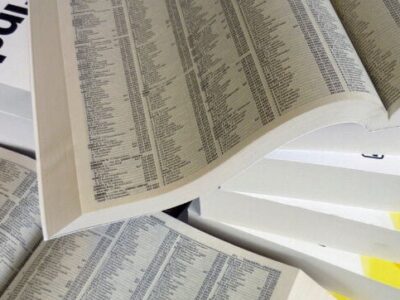◊ In light of the passing of Albert Reichmann in Toronto on December 17, 2022 at age 93, we bring your attention to this review of the most thorough biography of the Reichmann family, Anthony Bianco’s The Reichmanns: Family, Faith, Fortune and The Empire of Olympia & York.
As Brooklyn-based author Anthony Bianco chronicles in his new 800-page biography The Reichmanns: Family, Faith, Fortune and The Empire of Olympia & York (Random House, 1997), the spectacular rise and fall of the Reichmanns’s $10-billion business dynasty within a single generation seem not to have fundamentally changed this “family of elect destiny” — at least not outwardly.
“Albert, Paul and Ralph and their wives continue to reside in the same houses in which they have lived since the 1960s,” Bianco writes, “and to practice their faith in the same synagogues as do humble rank-and-file members of the ultra-Orthodox community that once revolved around them. In most families, the loss of a $10 billion fortune might have been expected to raise an embarrassing ruckus of accusation and recrimination, but the Reichmanns have all maintained a decorous silence, nursing their grievances privately while continuing to honor the requirements of family as conscientiously as they practice their religion.”
Having attained unprecedented access to family members — including the highly reclusive Paul, who rightfully emerges as “one of the most resilient and tenacious entrepreneurs of the twentieth century” — Bianco’s work is unmatched in its level of detail of both business and family matters. Encyclopedically researched, it is a sparkling, privileged account by a writer capable of assessing situations and personalities with a keen and judicious eye.
A staff writer at Business Week magazine, the fiduciarily-astute Bianco took a four-year sabbatical in order to write the book. A Catholic, he displays a thorough knowledge of the principles of Jewish Orthodoxy that have governed the conduct of his subjects, even as they ventured ever further into the material world. He also relates much important (and hitherto untold) history concerning Toronto’s orthodox community, which, in large part due to the Reichmann’s munificence, waxed ever bigger along with its generous benefactors.
Bianco devotes more than 200 pages to the family’s roots and activities in Hungary, Vienna, Paris and the war-time free port of Tangiers, Morocco, where the patriarch of the Reichmann dynasty, Samuel, amassed a fortune as a currency trader while his wife, the family matriarch Renee, worked to save thousands of Jews from the Nazis.
In the mid-1950s, brothers Edward and Louis and their families settled in Montreal and Paul, Albert and Ralph and families came to Toronto. In 1958, after they had jointly established a constellation of companies, Paul forayed into real estate development, almost by accident. In seeking to build a new warehouse for Olympia Floor & Wall Tile, the family rejected the top bid of $125,000 as exorbitant; Paul, acting as his own contractor, did the job for $70,000.
It was Paul’s uncanny business acumen, tempered by the cautious wisdom of Albert, Ralph and their father Samuel, that propelled O&Y’s early successes with a series of Toronto properties, including the Toronto-Dominion Centre, The Toronto Star Building and First Canadian Place. What undoubtedly made them moguls on a world scale was their acquisition in 1977 of a $313-million package of eight office towers at bargain-basement prices at a time when New York City seemed to be sliding into insolvency. Hailed as the real-estate “deal of the century,” the purchase netted an estimated tenfold profit or more within only two years.
Thereafter they built many huge towers in many cities, always to the best standards, on time and within budget. In the early 1990s, Canary Wharf, the mega-development of 24 office buildings in a remote section of London’s docklands, proved O&Y’s undoing. As Bianco puts it, Paul was a gambler by nature who seemed almost convinced of his own infallibility, and let his ambition run unchecked, even as the company was on the brink of the receivership into which it ultimately fell.
“They never drew a line on their own ambitions,” Bianco told The CJN during a recent interview in Toronto. “It would have been impossible for Paul to build a complex big enough or great enough that would have caused him to retire. I shudder to think what he would have done if Canary Wharf had succeeded right away. I guarantee he would have tried something on an even more massive scale; he would have been compelled to.”
Bianco won early support for the biography from Edward Reichmann, the older brother who had long wanted to see the family saga in print. “I spent countless hours with him in Toronto, New York and Jerusalem. He gave me all sorts of important family documents, but after a while I was also coming up with documents that he didn’t have; I was generating things that he really wanted to see. We were doing the same thing, in a way. There was an overlap of interests.
“I also made it clear to Edward that I was going to put him back into the family story, whereas in previous accounts it has always been the story of three brothers. Louis, the second brother, also had an interest in getting the story told right.”
Bianco wrote to Paul, Albert and Ralph, asking for their co-operation, but got no reply. Then Paul’s wife, Lea Reichmann, telephoned. “She said the letter convinced her that Paul should talk to me; the problem was getting his attention. Appointing herself my covert ally, she gave me his private number at home and convinced me to pester him at my end and she would pester him at her end.”
Eventually Paul gave Bianco five interviews, each four to six hours long. “Once you get to him, if he wants to talk about something, he talks about it fully without any prompting. If he doesn’t want to talk, he won’t.” Taking notes by hand, Bianco filled up an entire legal pad in the first interview alone.
Bianco devotes considerable space to the $102-million libel suit the family launched against Toronto Life magazine after a lengthy 1987 article gratuitously cast aspersions on the family’s philanthropic activities in wartime Tangiers. The suit sent a chill through the Canadian media establishment and threatened to bankrupt the magazine until the parties reached an out-of-court settlement in 1991 that involved a $1-million charitable donation and the publication of a full-page apology.
Was Bianco affected by this libel chill? “It was something I certainly thought about,” he admits. “I started with confidence in my ability to set a standard for research and writing that would keep me out of libel. It concentrates your mind to know that there has been a libel suit and you’re going over the same ground again: you pay attention.” (The Toronto Life lawsuit produced an unexpected bonus for Bianco, he says, since it compelled the Reichmanns to put much original family material onto the public record.)

Albert Reichmann
He also chronicles the great eruv controversy that threatened to split apart Toronto’s orthodox community in 1986. The conflict erupted after a zealous rabbi whom the Reichmanns had imported from Israel attacked the validity of the existing eruv, the fenced-in area within which it is halakhically permitted to carry on the Sabbath and religious holidays. Bianco rightly treats this more as a clash of rabbinical personalities than of religious principles, and his telling has all the force of an Isaac Bashevis Singer short story.
Dubbed “the Rothschilds of the New World,” the Reichmanns are unlike the Rothschilds because “they did not assimilate, and there was no dissimulation of Jewish identity from generation to generation,” Bianco observes. Indeed, almost all of the grandchildren of Samuel and Renee have reportedly kept faith with their religious roots — as, of course, have the brothers themselves.
“To stand apart in your own society and live according to traditional ways, and at the same time to succeed in business to that extent — that’s a remarkable achievement, and that’s what they did,” Bianco says.
While admitting some of his mistakes regarding Canary Wharf, Paul has always maintained that the project was a viable one, and time is proving him right. In contrast to the bleak vacancy rates of earlier days, the development’s 12 completed buildings are now about 84 per cent leased. This past year, Paul has invested $100 million — a sliver of his former personal wealth — for a 5 per cent share of the project. He explained to Bianco that he intends to see Canary Wharf, the largest project he has ever undertaken, through to completion.
“I think he’s in the early stages of a significant come-back as a developer,” Bianco says. “I expect him to be really successful at it because for the first time, he is constrained by the fact that he’s beholden to his financial partners in a way he never was before.”
A masterpiece of biography, Bianco’s definitive study ends with the very credible suggestion that the Reichmann’s achievements may not be over. “The family may never be as rich or as revered as they were … but history suggests that the final chapter of the Book of Reichmann has not yet been written.” ♦
© 1997








